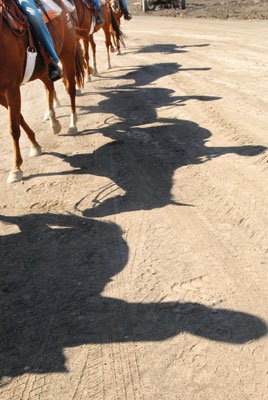When Teri Davis Patane, 32, lost her battle with systemic lupus
eight years ago, family and friends started looking for a fitting
memorial. Patane, who for the last few years of her life gave
informal riding lessons to children, always wanted to start a horse
riding camp, said Jean Arnaz, Patane’s high school friend.
Also with this story, a video of photo gallery.
When Teri Davis Patane, 32, lost her battle with systemic lupus eight years ago, family and friends started looking for a fitting memorial. Patane, who for the last few years of her life gave informal riding lessons to children, always wanted to start a horse riding camp, said Jean Arnaz, Patane’s high school friend.
So friends and family settled on a week-long camp for underprivileged children, bringing horses to kids who wouldn’t be able to ride otherwise. The camp has since grown into a week of fun, mostly for foster children.
“We thought that because Teri was so into horses it would be a neat thing to do,” said her husband Carmen Patane.
Arnaz likes that the camp takes disadvantaged kids under its wing in much the way that Teri took others under her wing.
Patane’s father Lon Davis said he and other volunteers enjoy seeing the smiles on the faces of the children. This year there were six participants.
With one hand on the arena rail, Davis watched the riders enter the sand arena, enclosed by a rusty, red metal fence, as the 8th annual Teri Davis Patane Memorial Horse Camp continued. It ended Sunday.
This year, the youngest camp-goer was 9, and the oldest 14. Children are recommended for the camp by churches and foster care agencies. Camp organizers try to make sure that different kids attend each year. The favorite part of the camp for volunteer and family friend Kristine Scopazzi is “seeing the change from when they come in to when they go home … they’re not shy when they leave.”
This seems fitting as Arnaz describes Patane as a leader in everything she did. As for riding and horses, “Teri taught everyone she was around.” Teri was the kind of friend and leader that took you under her wing when you were scared to do something, said Arnaz.
When the camp begins, participants are paired with a horse for the week.
“That’s their best friend for the week,” said Arnaz. In the past horses have been provided by Arnaz and Davis, and three to four others were borrowed.
The horses are pretty trail savvy, Davis said.
“Many kids have fears to overcome, but the horses kind of relate to them,” Davis said.
Nine-year-old Taya named her chestnut horse Skittles after her favorite candy. For Taya, the camp allowed her to ride for the first time.
“Camp is fun because you get experience with horses,” she said. “We went walking around the field and took pictures.”
Another camper, 13-year-old Art had ridden horses at his uncle’s house until he fell off. For him, camp was a chance to get back on a horse. He looked forward to learning how to become a better rider.
“The camp is really active … you can earn something that can be useful,” he said.
Patane’s husband, Carmen, instructed the young riders from a chestnut horse in the center of the arena. He wore a white cowboy hat, sunglasses and dusty riding shoes. One hand rested on the rump of the horse, the other held the reins. He had a water bottle in his collared shirt pocket and a cell phone clipped to his belt.
His 8-year-old-daughter Jacqueline Patane was also riding at the camp. Five months after she was born her mother died.
Many kids enter the camp not convinced they will have fun. Patane loves seeing the kids change their mind.
“It’s about exposure to riding horses and exposure to nature,” he said of the camp, which can make children open up in ways they don’t in a classroom. “Riding all day long you break down barriers.”
On a typical day at the ranch, the children draw numbers to determine who will clean horse stalls that day. One camp-goer wakes up early to feed horses and clean 13 horse stalls with the help of two adult volunteers.
“They learn a little bit of responsibility,” said Davis.
Alicia said cleaning the stalls was funny because “after you clean up all of them, they poop again,” she said.
The camp is funded by Gilroy Rotary Club and the Morgan Hill and San Martin Lions Club, said Davis. This year the Santa Clara County Sheriff Deputies also sponsored. The rest of the costs are covered by individual donations.
To contribute or find out more go to www.tdphorsecamp.org.














